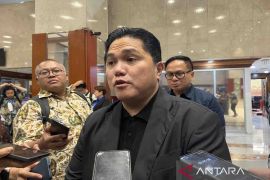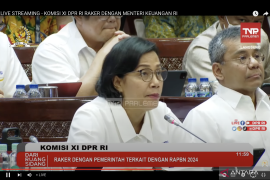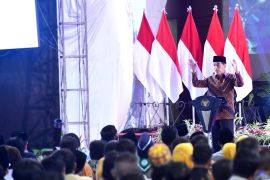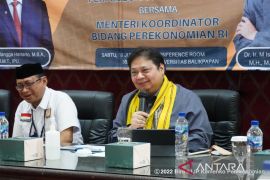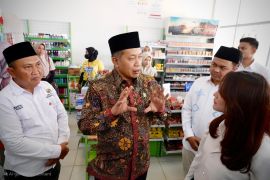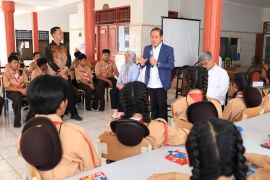"I believe that only by implementing just and equitable economic development, we can increasingly become stronger to face global competition," the president said.Jakarta (ANTARA News) - The Joko Widodo (Jokowi) Administration has a strong political will to implement just and equitable economic development across Indonesia, including in remote and outermost regions.
Development is not only for Java Island, or to cities, but to every region in the country, such as in the hinterland areas located in Indonesias eastern most province of Papua.
"I believe that only by implementing just and equitable economic development, we can increasingly become stronger to face global competition," the president said in his address to the annual session of the Peoples Consultative Assembly (MPR) on Aug 16, one day prior to the 72nd anniversary of Indonesias Independence.
He hoped that by doing so, nobody will feel they are second-and third-class citizens. "We are all Indonesian citizens," he stated.
All Indonesian citizens should receive equal benefits from developmental gains and be responsible to implement national development, he noted.
The Head of State particularly wanted the prices of fuel oil and other essential goods in the mountains and border areas of Papua to be the same as in other regions of the country.
"We want the people in Papuas border area to be proud of their country as the border areas have been developed as a front verandah of the country," Jokowi remarked.
In Oct last year, the president launched the program to set the fuel oil price in Papua to be the same as in the rest of the country. Previously, prices in Papua were much higher than in other regions of the country.
At that time, fuel oil price in Papua was as high as Rp100 thousand per liter as against only Rp7 thousand per liter in Java.
In accordance with the governments one-price fuel program, Jokowi has instructed Energy and Mineral Resources Minister Ignasius Jonan to issue a ministerial regulation on the one-price policy for RON 88 premium and 48 Diesel.
According to Jonan, Until mid-Aug 2017, not only Papua, but a total of 22 districts across Indonesia have applied the one-price fuel policy.
The one-price fuel program was the governments strong commitment, the minister noted in a statement on Aug 16.
The 22 districts include Puncak, Duga, Yalimo, Mamberamo Raya, Central Mamberamo, Tolikara, Intan Jaya, and Paniai Districts in Papua; Pegunungan Arafak and South Sorong Districts in West Papua Province; and Morotai District in North Maluku Province.
The others are Nunukan District in North Kalimantan, South Nias District in North Sumatra, Mentawai Islands District in West Sumatra, Jepara District in Central Java, Sumenep in East Java, Sumbawa District in West Nusa Tenggara, East Sumba District in East Nusa Tenggara, Wakatobi District in Southeast Sulawesi Province, Mahakam Hulu in East Kalimantan Province, Bengkayang District in West Kalimantan, and Talaud Islands District in North Sulawesi.
These districts are located in the regions considered as 3Ts: the outermost, foremost, and most backward. The government has paid additional attention to those regions.
The one-price fuel policy is expected to help boost the local economy in those areas.
The absence of adequate infrastructure in these regions is a great challenge in implementing the one-price fuel program in the 3Ts regions.
"One of the obstacles is infrastructure. Some have to be flown by aircraft. The second (challenge) is cooperation among concerned stakeholders in those respective regions to materialize the one-price fuel availability there," he noted.
In accordance with the governments One-Price Fuel Road Map, it has planned to operate 150 supply agents by 2019. There will be 54 suppliers in 2017, 50 in 2018, and 46 in 2019.
So far, the normal price of premium is Rp6,450 per liter and diesel is Rp5,150 per liter. However, in several remote areas such as in Papua, for instance, the prices increase from Rp8 thousand to Rp100 thousand per liter.
To support the program, state-owned oil and gas company PT Pertamina has strengthened its fleet of tankers for inter-island crude oil and oil fuel transport.
In 2016-2017 period, Pertamina has added additional units of general purpose (GP) ships, totaling 17.5 thousand dead weight ton (DWT) from three Indonesian shipyards.
Pertamina has planned to implement the policy in phases because many regions lacked the proper infrastructure, Pertamina senior vice president for fuel marketing and distribution, Gigih Wahyu Hari Irianto, told the press last April.
"The government hopes we could complete it all by the end of this year, but it really depends on the local infrastructure, which is out of our control," he explained. (*)
Reporter: Fardah
Editor: Heru Purwanto
Copyright © ANTARA 2017
